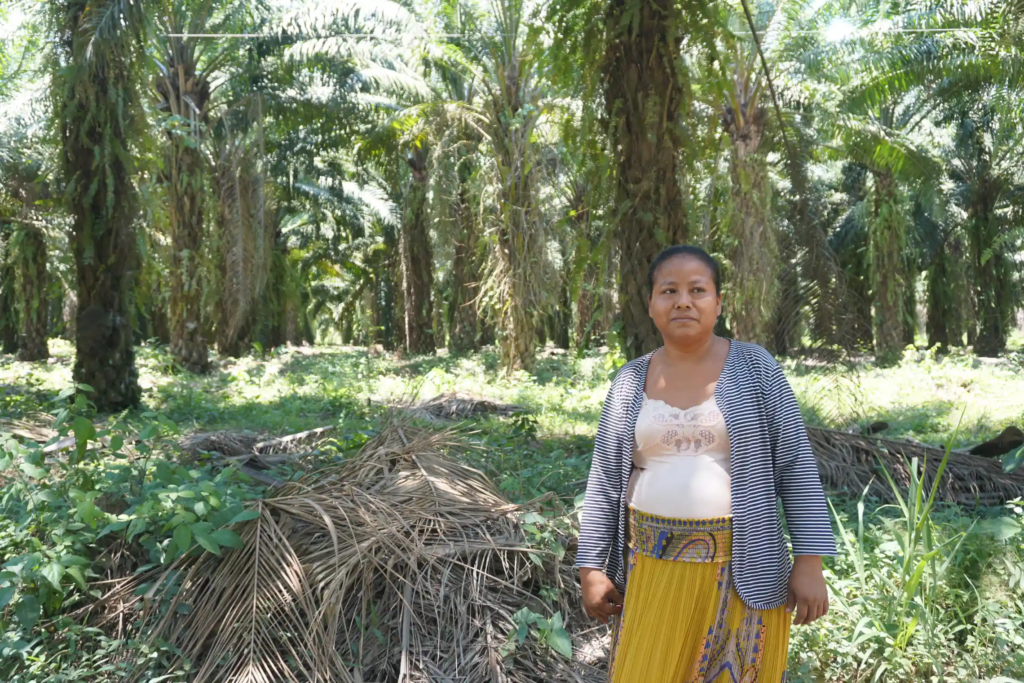
Photograph: Rich Brown
Bayron Xol, 26, hoped to send money home to defend smallholding in Indigenous Q’eqchi’ territory from encroachment by African palm plantation
The last time Florinda Xol saw her son Bayron, the 26-year-old was leaving for the US from their rural Q’eqchi’ Maya community of Río Zarquito in northern Guatemala. He felt a responsibility to help his widowed mother make ends meet – and hold on to their small plot of land.
This migration boom is driven in large part by increasing land inequality and the conflicts it generates, said lawyer Wendy Geraldina López of the Unit for the Protection of Guatemalan Human Rights Defenders (Udefegua), which documents such conflicts.
Big estates are expanding to build dams, mines and especially plantations of export crops like sugarcane, bananas and African palms, leaving farming communities with dwindling access to land and water – and sometimes displacing them, López said. Guatemala’s burgeoning African palm plantations, many of which supply giants like Cargill, Nestlé and ADM with palm oil, are often at the centre of these disputes.
Guatemala is already the second-most common country of origin for migrants arriving at the US-Mexico border, and migration from Q’eqchi’ territory, which began to accelerate rapidly about five years ago, continues to intensify. The number of migrants deported from the US and Mexico from the department of Alta Verapaz – the heart of Q’eqchi’ territory, where Florinda’s family lives – soared between 2020 and 2022, increasing 330%, faster than anywhere else in the country and more than three times the national rate, according to data from the Guatemalan Migration Institute.
Alta Verapaz has a poverty rate over 80%, and UN estimates put its share of moderately or severely food-insecure households above 80%, even before the Covid-19 pandemic. To put food on the table, families often forgo other basic needs such as medical expenses and schooling; the department’s illiteracy rate is over 30%. “Lack of access to land and water is the fundamental cause of these problems,” López said. Guatemala has one of the highest rates of land inequality in the hemisphere, and the problem is especially acute in Alta Verapaz and neighbouring departments.
After the UN special rapporteur for the rights of Indigenous people, Victoria Tauli-Corpuz, visited the region in 2018, she said: “Land rights aren’t respected, so many people are displaced … Landowners are so powerful that they even ignore or push aside judicial orders.” She also wrote: “Indigenous people are often treated as criminals simply for defending their lands.”
Little has changed since that visit. Many people, like Florinda, lack formal titles but say they have lived on their plots for decades or generations. Now they live with the fear of eviction; since 2018, evictions and criminalisation in Q’eqchi’ territory have become ever more frequent, according to Udefegua reports.
Landowners often justify these evictions by showing a legal title to the land in question. However, lawyers representing the communities say these titles are often fraudulent. In 2019, a Guatemalan court ruled in favour of a Q’eqchi’ community facing eviction, concluding that the original land title had illegally ignored the presence of Indigenous residents. A case review states this problem may extend throughout the country. The judges also ordered the release of the community leader Abelino Chub Caal, who had been imprisoned for two years.
This decision set an important precedent, but it remains an exception. The territory’s land ownership structure is still dominated by vast estates dating back to the 19th century. Guatemala’s 36-year armed conflict – sparked by a 1954 CIA-sponsored coup d’état – concentrated land ownership further as the military burned down hundreds of Maya villages in a genocide that displaced hundreds of thousands of people and led to the country’s first waves of migration to the US.
“This migration and criminalisation will worsen until the courts decide to look into land ownership fairly,” said López, “but given the power of the landowners and the deterioration of our justice system, for now this seems impossible.”
In the meantime, communities and families like Florinda’s continue to face agonising choices. Despite the trauma of his brother’s death, Bayron’s brother Fraymar, 20, said now he feels it’s up to him to try to reach the US. “If we knew we’d keep our land, I wouldn’t go,” he said.
Reporting for this story was supported by the Pulitzer Center
Original article by Rich Brown at https://www.theguardian.com/world/2023/may/17/guatemala-indigenous-immigration-detention-center-fire-edited-
